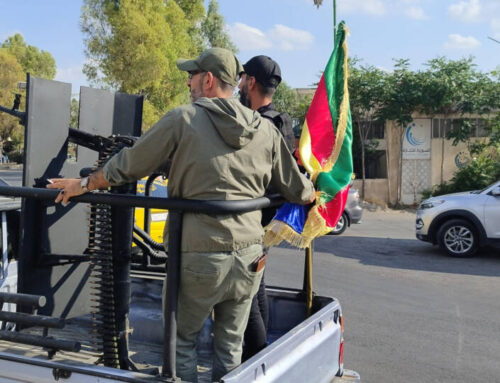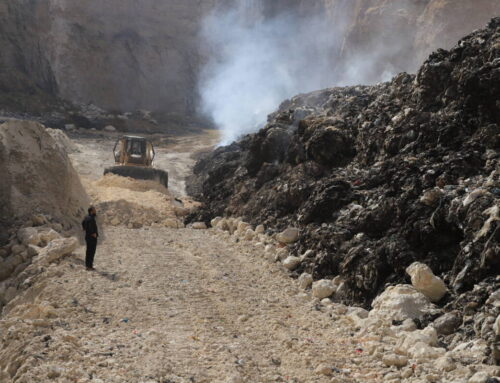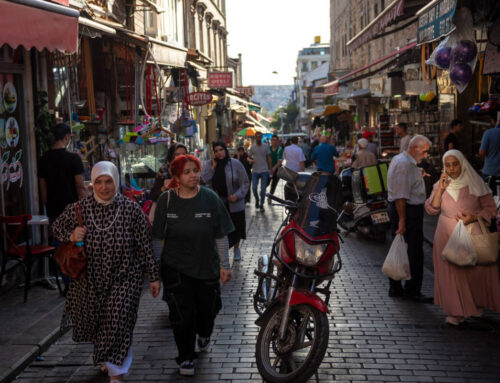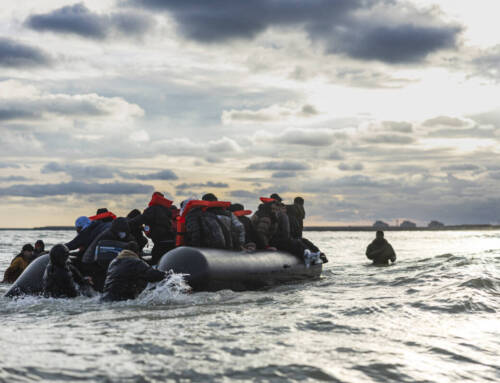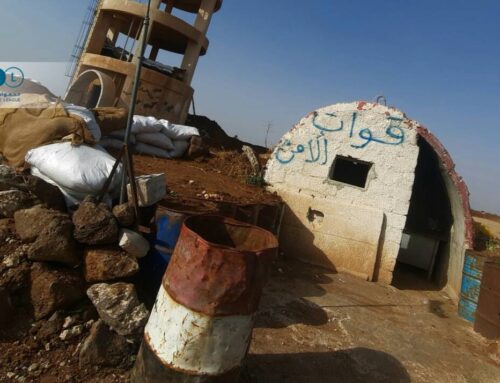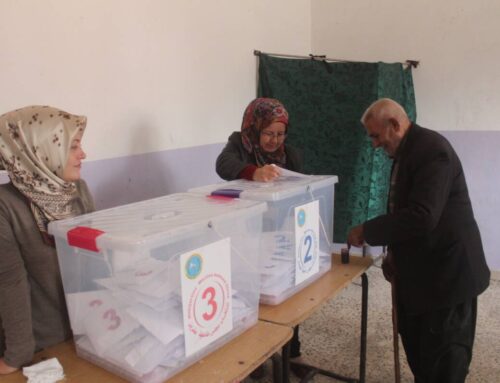Worsening conditions in Cyprus push scores to return to Syria
As life in Cyprus grows increasingly difficult for many asylum seekers, the number of Syrians opting into the island’s “voluntary return” program is going up. So far this year, 114 Syrians have returned, compared to just around 30 in all of 2023.
31 May 2024
NICOSIA — A minutes’ walk from terrace cafes in the old city of the Cypriot capital, Nicosia, around a dozen Syrian men roll up their blankets and sleeping pads in the courtyard of a mosque. Most have been homeless for months or years.
Two of the men, 24-year-old Eihab al-Fayyad and 28-year-old Muhammad Ahmad, sluggishly walk out from behind the mosque, their eyes sunken with exhaustion. Ahmad has been homeless since arriving and applying for asylum in Cyprus in April 2021, and al-Fayyad since November of the same year.
“In Cyprus, they treat us like animals, not human beings,” Ahmad told Syria Direct.
Al-Fayyad pointed to a discarded takeout container of leftover rice, open and spilling its contents into a patch of grass near the mosque. Sometimes, food like this is their only option for a meal. “Dogs live better than Syrians here,” he said.
Even as thousands of Syrians risk their lives to reach Cyprus by boat from Lebanon and Syria, life in the island nation is becoming unbearable for asylum seekers languishing there with little support. The number of people opting into the Cypriot government’s Assisted Voluntary Return (AVR) program and returning to the countries they fled is growing.
So far in 2024, 114 asylum seekers have voluntarily returned to Syria, compared to around 30 in all of 2023, Andreas Georgiadis, the head of the Cyprus Asylum Service, told Syria Direct.
Al-Fayyad fled fighting in Syria’s northwestern Idlib province in 2018. Ahmad, who is Kurdish, fled the Afrin area of Aleppo province in 2013 after it came under attack by Free Syrian Army (FSA) factions. Both first fled to Turkey, where al-Fayyad stayed for about three years and Ahmad for about eight, before boarding boats to Cyprus in 2021, hoping to find a better future in the European Union (EU) member state.

Muhammad Ahmad (left), 28, and Eihab al-Fayyad (right), 24, sit outside the mosque where they had been sleeping in Nicosia, 29/3/2024 (Hanna Davis/Syria Direct)
The two men met in Cyprus, and became close friends throughout years of hardship, rarely leaving each other’s sides, Ahmad said. “He is from a different province, but we met each other here and have spent three years together. He became like my brother.”
Application backlog
With a population of approximately 1.2 million, Cyprus receives the highest number of asylum applications per capita in Europe. The Mediterranean island is the closest EU member state to Syria and Lebanon, from which many Syrians are fleeing deepening poverty and violence.
The number of Syrians arriving in Cyprus surged during the first four months of 2024, with more than 3,400 arriving by the end of April. However, following Cyprus’s April 13 decision to stop processing asylum applications from Syrians, coupled with ongoing efforts to tighten its policing of the sea, the number of Syrian arrivals fell in May.
Read more: Syrians sail for Cyprus in the thousands as island seeks to stem the tide
Andreas Georgiadis, the head of the Cyprus Asylum Service, told Syria Direct only around 100 Syrian asylum applications were submitted this month, significantly fewer than the 944 applications in April.
Halting the processing of Syrian asylum applications “will undoubtedly” contribute to a growing backlog of cases as more asylum seekers arrive, Corina Drousiotou, a legal advisor at Cyprus Refugee Council, told Syria Direct. Even before the April 13 decision, the average wait time for an asylum determination was already about two years, Drousiotou said.
If Syrians can withstand the long wait, around 90 percent are eventually offered subsidiary protection status, the UN Refugee Agency’s (UNHCR) Cyprus representative, Katja Saha Savarimuthu, told Syria Direct. Subsidiary protection is a form of international protection for those who do not meet the requirements of refugee status, and is commonly given to Syrians in Cyprus.
While asylum seekers await their application results, the Cypriot government provides a stipend of about 300 euros each month. However, if they become homeless—like al-Fayyad and Ahmad—and cannot prove a valid address, they lose access to it. Meanwhile, they cannot legally work for their first nine months in Cyprus, and then only in limited sectors while their asylum applications are pending.

Eihab al-Fayyad points to a container of leftovers spilled over the grass—food he said homeless asylum seekers like himself sometimes have no other option but to eat, 27/3/2024 (Hanna Davis/ Syria Direct)
Repatriation?
In May, Cyprus announced it was among multiple EU member states seeking the recognition of “safe zones” in Syria to allow for refugee returns. “The repatriation of Syrian nationals under strict conditions would decongest our migrant reception facilities and contribute to the successful integration of migrants,” Interior Minister Constantinos Ioannou said at the time.
Ioannu’s statement came just days after the 27-member bloc adopted a landmark overhaul of its migration and asylum policies to tighten border control measures and ensure burden sharing among member states. Critics say the pact aims at keeping people out of Europe and infringes on refugees’ rights to claim asylum.
Ahmad and al-Fayyad would face severe danger if they returned to Syria. Ahmad’s mother and father warn him not to come back. His hometown, Afrin, is occupied by Turkish and Turkish-backed forces accused of serious human rights abuses, largely against Kurds like him.
Al-Fayyad recently learned his mother, father and older sister were killed by regime bombardment in Idlib. His family had lived in an internal displacement camp in the province since their home was destroyed in 2020. He now only has two siblings left: a 26-year-old brother and 38-year-old sister, both in Idlib.
“I’ve lost everything,” he said. In Syria, “there is death and injustice. There is no death here [in Cyprus], but there is injustice. I can no longer bear the injustice on this island.”
Are returns really voluntary?
Human rights activists have criticized Cyprus’s “voluntary” return policy, noting that poor living conditions leave asylum seekers with few other options.
“How ‘voluntary’ is it if you’re living in destitution?” Drousiotou said. She is concerned about monetary incentives offered for returns, as well as the repatriation of asylum seekers from detention centers in Cyprus. “The lack of an effective monitoring mechanism of return makes it difficult to know if there are or there aren’t any issues,” she added.
Over the past year, Cyprus has implemented multiple policies that have made life more difficult for asylum seekers and refugees. Notably, in October 2023, the government extended the amount of time asylum seekers must wait to legally work from one month to nine months. “This was a very big setback,” Drousiotou said.
Two months later, Cyprus amended its naturalization rules, introducing “irregular entry” as a criterion to judge an applicant’s “good character.” Because the vast majority of asylum seekers arrive on the island irregularly, the change effectively blocks them from eventually gaining citizenship.
“The government’s priority is to deter people from coming and encourage people to leave,” Drousiotou said. “Integration is always the last priority. It sends a very clear message that you don’t have any long-term prospects in this country. Or, if you do remain, you will always be on the sidelines.”
Rising homelessness
As asylum seekers continue to arrive in Cyprus—if at a slower rate than before—they encounter a threadbare support system and few resources to help them as they begin a lengthy wait. As a result, increasing numbers of asylum seekers face homelessness.
At the end of March, Cyprus hosted around 43,000 international protection beneficiaries, including those with both refugee and subsidiary protection status. Around 30,000 people had asylum applications or appeals pending, according to the UNHCR. There are no statistics available regarding how many asylum seekers in Cyprus are currently homeless.
“While fewer people are arriving than previously and the number of returns and relocations has increased, those who come find a [humanitarian] system that is strained and already saturated,” Elizabeth Kassinis, the head of Caritas in Cyprus, told Syria Direct. “It’s a very small place with very limited economic prospects.”
Cyprus Refugee Council, with a staff of 18, is UNHCR’s only implementing partner on the southern Greek Cypriot side of the island, where most asylum seekers are located. In all, 14 non-governmental organizations (NGOs) and associations, most with just a few employees, work to assist tens of thousands of asylum seekers and refugees.
“There are a lot of places where the system, and society more generally, falls short,” Kassinis said. “Some vulnerabilities don’t get assessed properly or get glossed over, or sometimes [asylum seekers] don’t have the language skills or basic resources to follow up.”
Meanwhile, Cyprus faces a housing crisis. To leave the Pournara Reception Center—where asylum seekers are placed when they first arrive—requires proof of an address. Given a lack of affordable housing in Cyprus, many asylum seekers buy fake addresses to get out. Al-Fayyad paid around 100 euros for a fake address in 2021.
“We don’t have an immediate solution to accommodation,” Drousiotou said, noting that there are no homeless shelters on the island. Cypriot families have historically relied on family ties in place of a government-run welfare network.
With support from EU grants, Cyprus is in the process of expanding Pournara and building a new reception center for refugees. Still, “it’s a very expensive issue to tackle,” Drousiotou said.

Eihab al-Fayyad, 24, said his hope for a better future in Cyprus has faded, two and a half years after reaching the island, 28/3/2024 (Hanna Davis/Syria Direct)
Hope fades
Ahmad and al-Fayyad stroll apprehensively past tourists sipping spring cocktails and lattes. They opt for Nicosia’s less crowded side streets, hoping to avoid attracting unwanted attention or stirring any problems with Cypriots.
Tensions between refugees and the Cypriot host community are spiking, worsened by poor integration efforts and racist anti-refugee rhetoric by the country’s far-right politicians. In January, an improvised explosive device exploded outside the Nicosia offices of KISA, a human rights organization that works with asylum seekers.
“There’s been an increase in negative attitudes,” Drousiotou said. “People are more emboldened to be racist or intolerant.”
What opportunities are available to asylum seekers, like English classes run by an NGO in Nicosia, can feel out of reach. “How can I go like this?” al-Fayyad said, gesturing to his worn-out clothes and dirt-smudged skin.
Al-Fayyad’s hope for a better future, the same hope that spurred him to risk his life in the Mediterranean to reach Cyprus two and a half years ago, has faded. He frequently thinks of ending his life. “My heart is burning,” he said.
When Syria Direct first met Ahmad and al-Fayyad in late March, they at least had a steady place to sleep outside a mosque. A month later, Cypriot police made them leave the premises.
The two friends have been sleeping on the streets ever since.


